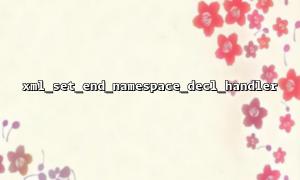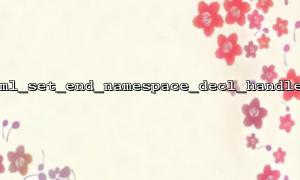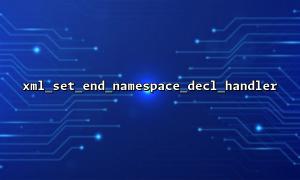When using PHP's XML parser to process XML files, the declaration and end processing of the namespace is an important but overlooked task. The xml_set_end_namespace_decl_handler function is specifically used to set the callback function at the end of the namespace declaration. When debugging such problems, we often encounter situations such as namespace not correctly identified or parser behavior abnormalities. This article will introduce how to identify and solve these problems with the help of debugging.
First, understand the purpose of xml_set_end_namespace_decl_handler :
xml_set_end_namespace_decl_handler(XMLParser $parser, callable $handler): bool
This function sets a callback function for the XML parser, which is called when the namespace declaration ends. This is often useful when dealing with XML files that use multiple namespaces.
For debugging convenience, prepare an XML example containing a namespace declaration:
<?xml version="1.0"?>
<root xmlns:h="http://gitbox.net/html" xmlns:f="http://gitbox.net/furniture">
<h:table>
<h:tr>
<h:td>Chair</h:td>
<h:td>Table</h:td>
</h:tr>
</h:table>
</root>
This example uses two namespaces, used for html and furniture .
We output the namespace declaration and end information of the namespace by setting the namespace processing function:
$parser = xml_parser_create_ns();
xml_set_end_namespace_decl_handler($parser, function($parser, $prefix) {
echo "End of namespace: Prefix = $prefix\n";
});
xml_set_element_handler($parser, function($parser, $name, $attrs) {
echo "Start Element: $name\n";
}, function($parser, $name) {
echo "Ending Element: $name\n";
});
$xml = file_get_contents("example.xml"); // Assumptions XML Save the file locally
if (!xml_parse($parser, $xml, true)) {
echo "XML Parsing error: " . xml_error_string(xml_get_error_code($parser));
}
xml_parser_free($parser);
The anonymous function in this example will directly output the prefix at the end of the namespace, helping us confirm which namespaces are closed when.
If you find that the namespace end callback function is not called at all, it is possible that the namespace declaration in XML is not really closed (the scope runs through the entire text after declaration in the root element). This is the expected behavior, not the function failure.
When multiple namespaces are frequently switched, make sure you record the start and end events in xml_set_start_namespace_decl_handler and xml_set_end_namespace_decl_handler respectively to verify the namespace scope. For example:
xml_set_start_namespace_decl_handler($parser, function($parser, $prefix, $uri) {
echo "Namespace begins: Prefix = $prefix, URI = $uri\n";
});
With end_namespace_decl_handler , you can clearly see the full life cycle of the namespace.
Make sure you are using a parser with namespace support to create the function xml_parser_create_ns() instead of xml_parser_create() . Otherwise, these namespace-related processing functions will not work.
To more conveniently troubleshoot problems, you can write debug information to the log file:
$logFile = fopen("debug.log", "a");
xml_set_end_namespace_decl_handler($parser, function($parser, $prefix) use ($logFile) {
fwrite($logFile, "End of namespace: Prefix = $prefix\n");
});
This allows you to review the process of the namespace without console output, especially when debugging in production environments.
xml_set_end_namespace_decl_handler is an important tool for handling XML namespaces. When debugging, please pay attention to using a suitable parser, use it with start_namespace_decl_handler , and observe the namespace life cycle through logging or real-time output. Through these methods, you can more effectively locate namespace-related problems and improve the stability and accuracy of XML data processing.















